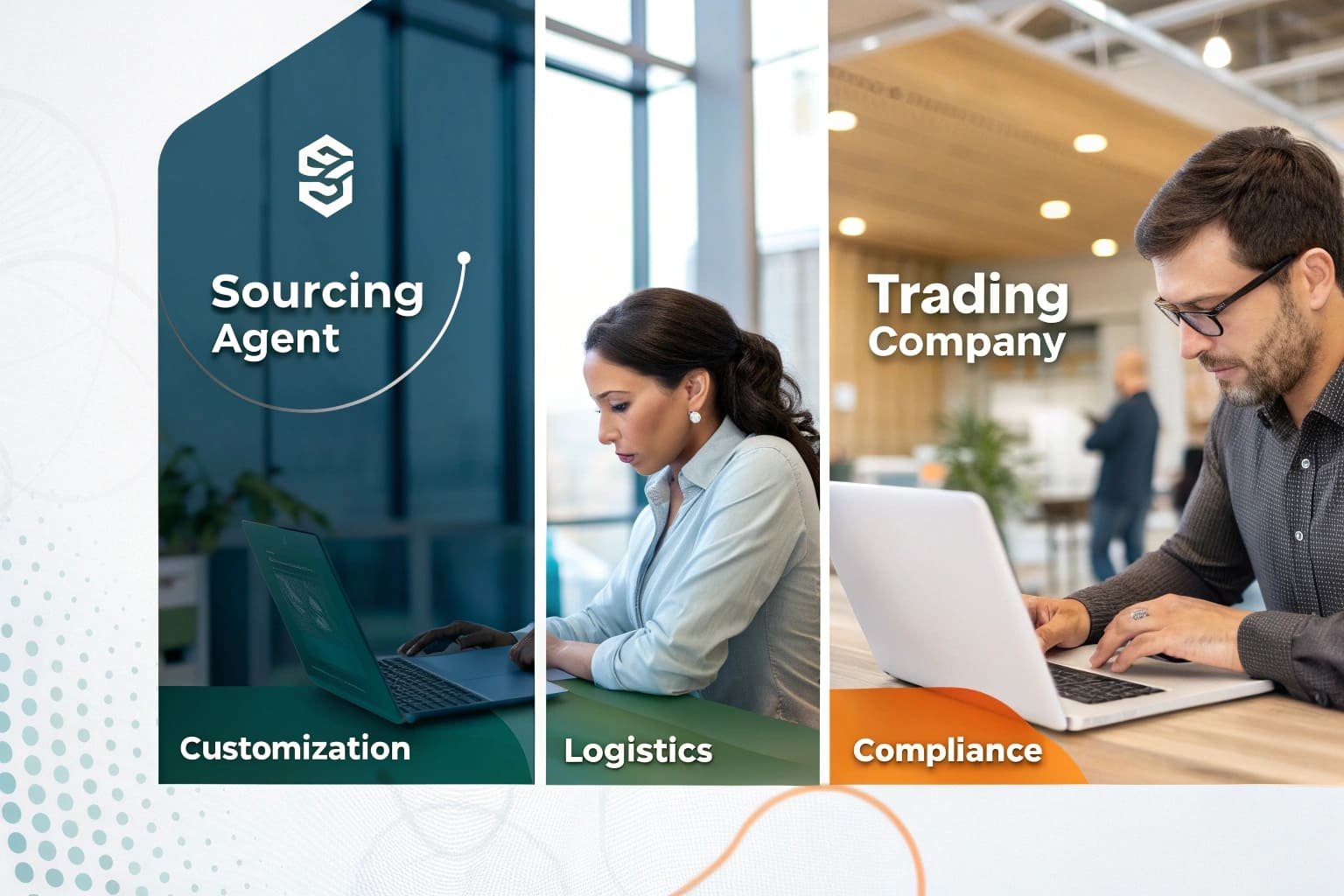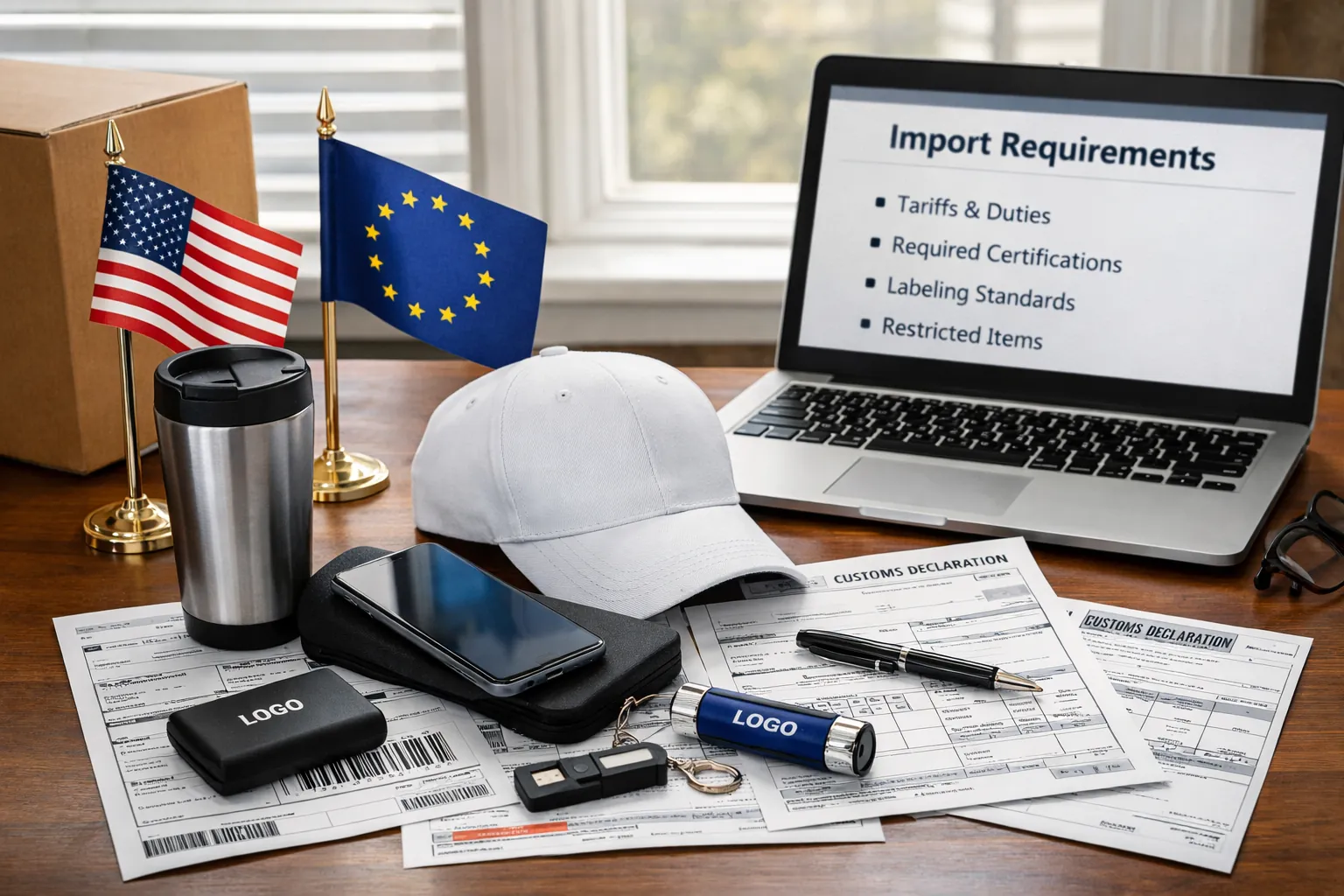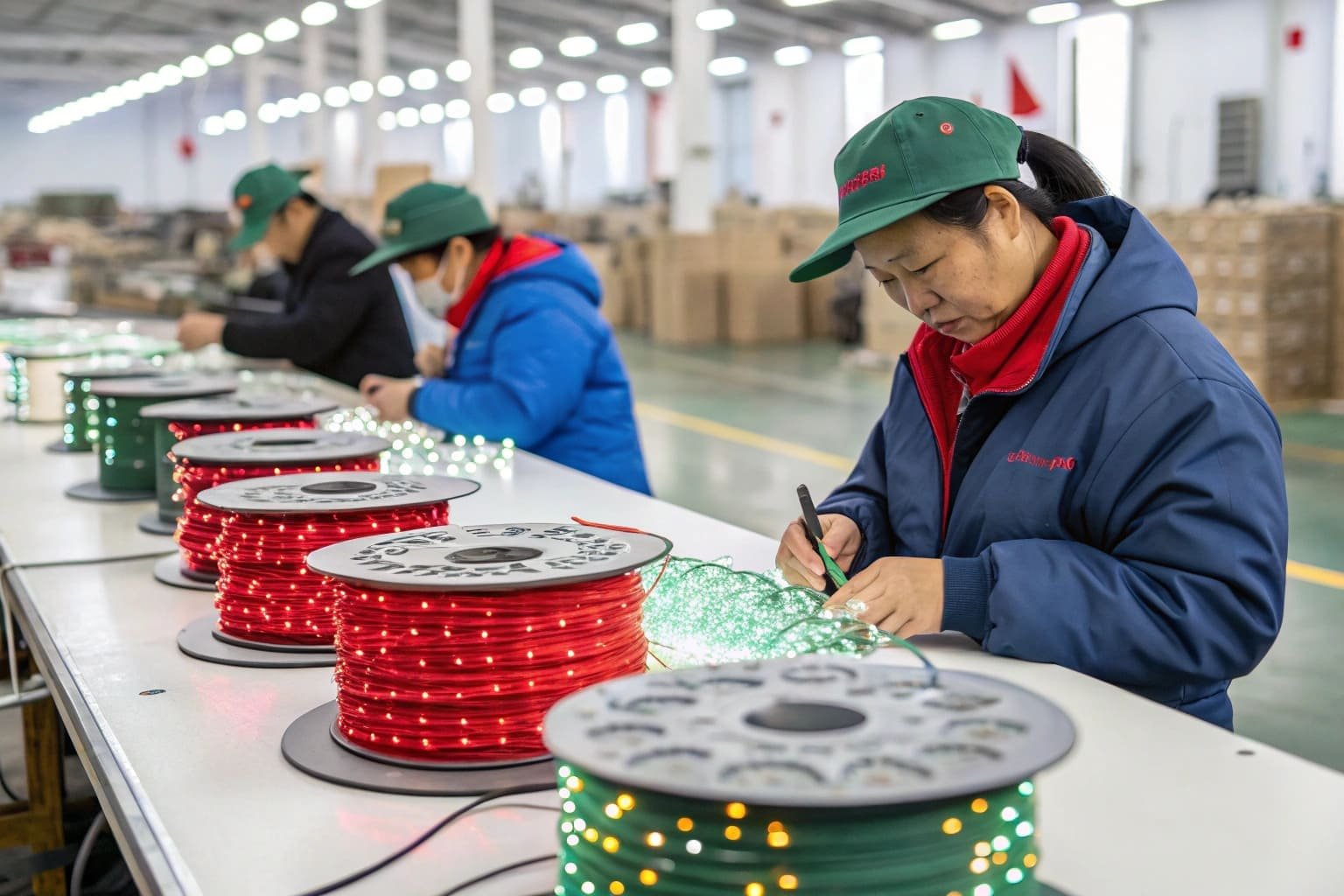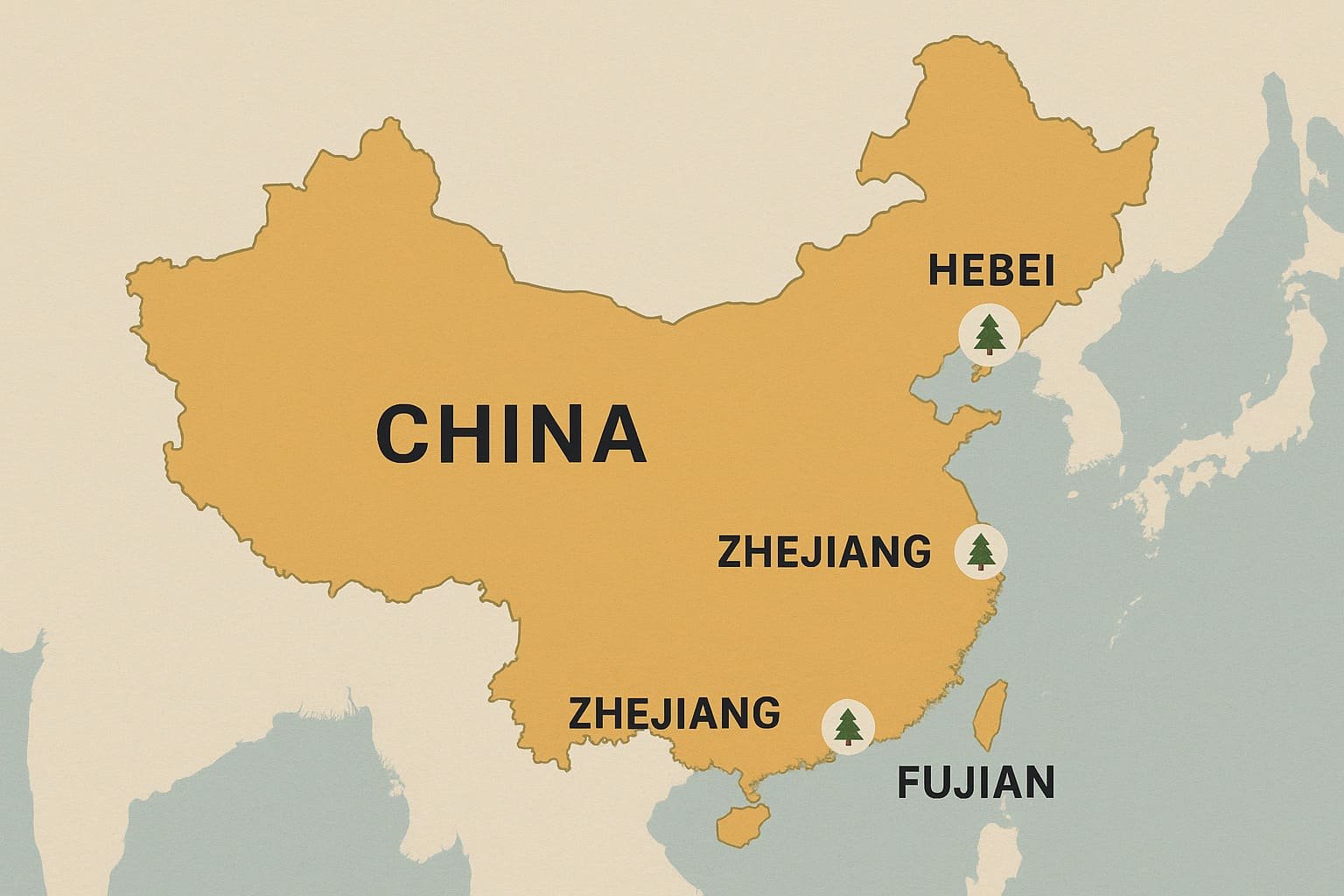In this year’s Canton Fair, several of my European and American clients received brochures and name cards from Chinese sourcing agents. These agents claimed they could help international buyers procure anything made in China—from injection molding machines to ceramic mugs—for just a 5% commission on each purchase order.
Sounds attractive, right?
But in our meetings, my clients asked a fair question: “Angela, are these sourcing agents actually reliable?”
It’s a good question. And one I think many first-time buyers are silently asking, especially when approaching a China-based sourcing agent for the first time. So let’s unpack it properly.
Thinking of hiring a Chinese sourcing agent? This guide breaks down their pros, red flags, commission structures, and how they compare with trading companies—based on real buyer reviews and expert sourcing insights.
Are Chinese sourcing agents reliable?
Yes, Chinese sourcing agents can be reliable—but only if they are properly vetted, transparent with pricing, and aligned with your sourcing goals. Without due diligence, buyers may face scams, hidden markups, or poor communication.
The term "sourcing agent" covers a wide spectrum—from experienced professionals with established networks, to one-person freelancers operating with little oversight. While some agents provide real value by negotiating prices, managing timelines, and ensuring product quality, others may exaggerate capabilities or disappear after receiving payment.
A Reddit user once shared:
"Paid $1,000 for samples. Never got them. Agent ghosted."
These cases aren’t rare—which is why buyer education is crucial.
The key is to understand their structure, limitations, and most importantly, how they align with your business goals.
✅ True
Some sourcing agents in China operate with integrity and deliver value.
❌ False
Thinking that all sourcing agents are untrustworthy is inaccurate.
Why do buyers work with sourcing agents?
Foreign buyers often use sourcing agents to help navigate language barriers, consolidate multiple suppliers, and coordinate production in China.
You might benefit from a sourcing agent if:
- You’re an Amazon seller working with small MOQs
- You’re testing a new product category or project
- You need fast sampling across varied suppliers
- You’re launching on a limited budget
Good agents can consolidate communication, reduce your search time, and help manage vendor relationships—especially when dealing with smaller orders or fragmented product categories.
What are the risks when working with sourcing agents?
The most common risks include payment fraud, inflated pricing, poor communication, and lack of supply chain accountability.
Here’s a breakdown based on real buyer stories:
| Typical Problem | Buyer Feedback | How to Avoid |
|---|---|---|
| Payment scams | "Paid $500, no updates in 2 weeks." | Use formal contracts and split payments |
| Mark-up abuse | "Agent added 30% without telling me." | Request original factory quotes and compare |
| Poor communication | "Always says ‘OK’ but misunderstands." | Demand weekly reports, do voice calls |
| Hidden identity | "Didn’t know which factory was making my goods." | Ask upfront if factory disclosure is included |
Sourcing Agent vs Trading Company: What’s the difference?
A sourcing agent helps you find suppliers and charges a commission, while a trading company offers end-to-end supply chain services and sells products directly.
Here’s a detailed comparison to help clarify the difference:
| Dimension | Sourcing Agent | Trading Company (Plentmax) |
|---|---|---|
| Product Scope | Flexible across many categories | Focused on promotional items |
| Sourcing Method | Based on buyer request each time | Uses vetted factory network |
| Price Transparency | Commission-based, varies | Product + service quoted as bundle |
| Customization | Limited to what factory allows | Co-design, branding, packaging included |
| Communication | One-to-one (freelancer-style) | Structured team with account manager |
| Logistics | Mostly FOB, buyer handles rest | FOB, CIF, DDP available |
| Risk Handling | Acts as go-between | Full ownership of quality & delivery |
| Compliance | May lack compliance knowledge | Offers CE, RoHS, Prop65 documentation |
| Design Support | Rare | In-house creative team for packs, visuals |
| After-Sales | Uncommon | Dedicated post-delivery team |
| Best For | Amazon, dropship, trial orders | Repeat buyers, branded products |
| Business Model | Task/fee-based | Partnership, long-term model |
✅ True
Sourcing agents and trading companies often serve complementary roles.
❌ False
Assuming one is categorically better than the other limits your sourcing strategy.
Which option is right for you?
If you’re a small Amazon seller or just starting your sourcing journey, a sourcing agent may offer the flexibility you need—especially when dealing with a wide range of products or smaller orders.
But as your business grows, working with a specialized trading company like Plentmax can bring more strategic advantages: access to long-term factory partners, product development support, full logistics coordination, and even payment flexibility.
In fact, many of our current clients started out as small e-commerce businesses—and we’ve grown together over time.
📩 If you’re just getting started and unsure whether to work with a trading company or a sourcing agent, feel free to contact us—we’re happy to offer honest advice based on your business stage.
How much do sourcing agents charge?
Sourcing agents typically charge a 5–10% commission on order value, but fees may vary based on services and transparency.
Let’s break down a sample scenario:
- Product cost from factory: $1,000
- Agent commission (8%): $80
- Additional sample coordination: $30
- Logistics support (FOB coordination): $40
- Total billed by agent: $1,150
Tips:
- Ask for factory invoice to spot markup
- Confirm if sampling & freight are included
- Check if 3rd-party inspection is charged separately
How to vet a sourcing agent properly?
To vet a sourcing agent, use this checklist and ask the right questions before sending money.
Checklist:
- ✅ Business license + company registration
- ✅ Written service scope and price model
- ✅ Factory verification support
- ✅ Prior client references or case studies
- ✅ Sample reporting formats (for QC, progress)
- ✅ Clear refund/termination policy
Always start small. Test their communication, turnaround, and reporting before scaling to larger orders.
📝 Mini Case Study: From Agent to Trading Company
One of our clients, a mid-sized European retailer, started working with a freelance sourcing agent to test products in China.
At first, it worked: they were able to get samples quickly across multiple categories. But as soon as orders scaled, issues surfaced: inconsistent quality, unclear factory disclosure, and delayed shipments.
When they transitioned to Plentmax, we helped restructure their supply chain:
- Matched them with 3 vetted long-term factories
- Built custom packaging & branding for their retail products
- Shifted logistics from FOB-only to full DDP door-to-door
The result? Within 18 months, they had consistent repeat orders and cut logistics delays by 40%.
This story reflects a common reality: agents can be a great starting point, but trading companies often become the more reliable growth partner.
✅ True
Many successful buyers begin with sourcing agents and later grow with trading companies.
❌ False
You must pick one model forever—it’s actually common to use both at different stages.
Frequently Asked Questions about China Sourcing Agents
What does a sourcing agent actually do?
A sourcing agent finds suitable suppliers in China, negotiates pricing, follows up production, and coordinates delivery. They act as your local representative.
Are sourcing agents in China legal and regulated?
Yes, but not all are registered businesses. Always ask for their license and verify their operational address before working together.
Should I use Alibaba or a sourcing agent?
Alibaba is great for browsing and contacting suppliers. A sourcing agent provides more personalized help, supplier filtering, and follow-up management.
How do I avoid scams when using a China sourcing agent?
Start with small orders, sign contracts, verify company documents, and never pay in full upfront unless trust is fully established.
Can I work with a sourcing agent and still control my brand?
Yes—but clarify IP protection and ownership terms in writing. A good agent supports your brand without claiming ownership.
What’s the difference between a sourcing agency and a freelancer?
Agencies often have teams and systems. Freelancers may be cheaper, but pose higher risks in availability, quality control, and professionalism.
Can I switch from sourcing agent to trading company later?
Absolutely. Many brands begin with agents to test ideas, then move to trading companies like Plentmax for consistency, scale, and integrated services.
Extended FAQ (New)
What’s the risk of sourcing agents switching factories without telling you?
Some agents might change suppliers mid-project due to cost or availability—without notifying the buyer. This can lead to product inconsistency. Always ask for factory details in writing and lock them into your agreement.
How can I know if a sourcing agent is hiding commissions?
Ask for direct factory quotes and compare them to your final invoice. Also, insist on signed breakdowns. Transparency is the first sign of a trustworthy agent.
Do sourcing agents help with product packaging and branding?
Most agents focus on procurement, not design. If branding and packaging are key to your business, consider a trading company with in-house design capabilities.
What’s better for repeat orders—agent or trading company?
Trading companies often build long-term supplier relationships, which helps ensure consistency in quality, pricing, and delivery. This is harder to guarantee with agents who change suppliers frequently.
Can I use a sourcing agent just for factory search?
Yes—some buyers hire agents only to shortlist vetted factories, then take over negotiations and production directly. Just be clear on deliverables and costs.
Is there a sourcing agent certification in China?
No official government certification exists. Some agents claim “ISO” or “Alibaba Gold Supplier” status, but these don’t guarantee reliability. Vet them the same way you’d vet a factory.
Final Thoughts: Are Chinese sourcing agents worth it?
Chinese sourcing agents can be valuable partners for international buyers—but only if they are carefully selected and aligned with your business goals.
They work best for:
- Flexible, small-volume, multi-category purchasing
- Buyers who lack local sourcing infrastructure
- Those needing cost-efficient project-based help
But if you’re sourcing branded promotional products, managing repeat orders, or looking to optimize your supply chain long-term, consider partnering with a professional trading company like Plentmax.
🧹 Still unsure whether a sourcing agent or a trading company fits you best?
Here’s how we help:
- ✔️ Free consultation for first-time buyers
- ✔️ Honest analysis of your sourcing model
- ✔️ A network of 50+ long-term factory partners
📩 Message us at Plentmax—we’ll help you build the right sourcing plan for your current stage.
You Might Also Like
First-time importers often stumble on basics—this guide shows safer steps for promotional product sourcing.
6 Tips for importing promotional items from China the first time












